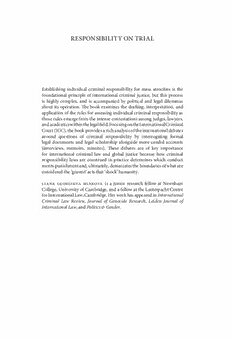
Responsibility on Trial: Liability Standards in International Criminal Law PDF
381 Pages·2023·1.238 MB·English
Most books are stored in the elastic cloud where traffic is expensive. For this reason, we have a limit on daily download.
Preview Responsibility on Trial: Liability Standards in International Criminal Law
Description:
Establishing individual criminal responsibility for mass atrocities is the foundational principle of international criminal justice, but this process is highly complex, and is accompanied by political and legal dilemmas about its operation. The book examines the drafting, interpretation, and application of the rules for assessing individual criminal responsibility as those rules emerge from the intense contestations among judges, lawyers, and academics within the legal field. Focusing on the International Criminal Court (ICC), the book provides a rich analysis of the international debates around questions of criminal responsibility by interrogating formal legal documents and legal scholarship alongside more candid accounts (interviews, memoirs, minutes). These debates are of key importance for international criminal law and global justice because how criminal responsibility laws are construed in practice determines which conduct merits punishment and, ultimately, demarcates the boundaries of what are considered the 'gravest' acts that 'shock' humanity.
See more
The list of books you might like
Most books are stored in the elastic cloud where traffic is expensive. For this reason, we have a limit on daily download.
